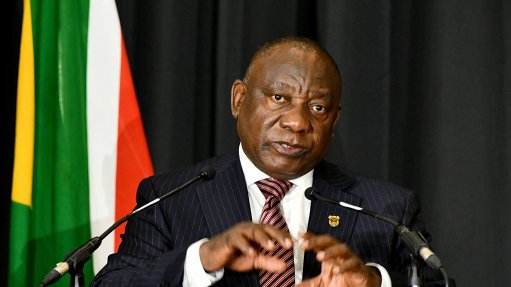
President Cyril Ramaphosa
President Cyril Ramaphosa has acknowledged the risks associated with South Africa’s transition from coal to renewables but insists the “risks of not undertaking an ambitious and just transition are far greater.”
Speaking during the virtual launch of the Oxford ‘Handbook on the South African Economy’, the President said the commitments made by South Africa to avert a climate crisis carry “significant risks”.
“These include risks to our energy security, scale of industrialisation, levels of employment and economic activity in coal-dependent communities.
However, the risks of not undertaking an ambitious and just transition are far greater,” Ramaphosa warned.
One of the emerging risks related to the Carbon Border Adjustment Mechanism (CBAM) that South Africa’s key trading partner, the European Union (EU), aims to implement from January 2023, with a transitional period to either 2025 or 2026.
A recent analysis by Trade and Industrial Policy Strategies on the imposition, under the CBAM, of a tax on embedded greenhouse-gas emissions on carbon-intensive imports into the EU, shows that the risk to the South African iron, steel and aluminium industries is particularly high.
Meanwhile, Ramaphosa said various institutional mechanisms and policies have been created to steer the country’s just transition, including the Presidential Climate Commission, which had “provided helpful advice that saw us raise our climate ambition at COP26”.
Ahead of the Glasgow conference, South Africa revised its Nationally Determined Contribution to include a new 2030 emissions range of 420- to 350-million tons of carbon dioxide equivalent (Mt CO2-eq), representing a marked improvement on its 2015 pledge of 614 Mt CO2-eq to 398 Mt CO2-eq.
The move proved pivotal in facilitating a ‘Just Energy Transition Partnership’ with the EU, the US, the UK, Germany and France that will see $8.5-billion of grant and concessional loan financing being offered to support South Africa invest in reducing emissions.
“This work, coordinated by former Reserve Bank deputy governor Daniel Mminele, takes us some way towards holding rich countries to their obligations under international treaties to contribute towards the decarbonisation of developing countries,” Ramaphosa said.
He spoke on the same day that the Department of Mineral Resources and Energy (DMRE) issued a request for proposals for 2 600 MW of new wind and solar photovoltaic capacity under bid window six (BW6) of the Renewable Energy Independent Power Producer Procurement Programme (REIPPPP).
The DMRE also reiterated that the deadline for financial close for the 25 BW5 projects selected in October remained the end of April, despite concerns that some of the projects will struggle to meet that deadline, owing partly to the rise in the prices and a supply squeeze on several renewables components.
The department has already delayed, on three separate occasions, financial close for the more controversial Risk Mitigation Independent Power Producer Procurement Programme for 2 000 MW of new capacity.
A signing ceremony was expected to take place in Pretoria on March 31 but was postponed “due to outstanding matters and conditions to be addressed in respect of the power purchase agreements with Eskom, and the need to provide the preferred bidders and their lenders adequate time to undertake due diligence reviews of the project agreements”.
In response to questions on whether any of the REIPPPP BW5 projects were facing difficulties in meeting the end of April deadline, the Independent Power Producer Office said that the department and all preferred bidders were “on track to signing agreements as planned”.